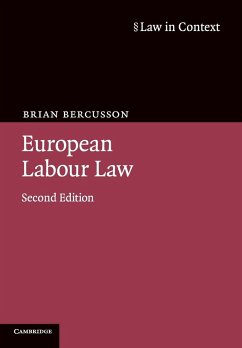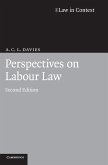Brian Bercusson
European Labour Law 2ed
Brian Bercusson
European Labour Law 2ed
- Broschiertes Buch
- Merkliste
- Auf die Merkliste
- Bewerten Bewerten
- Teilen
- Produkt teilen
- Produkterinnerung
- Produkterinnerung
This extensively updated second edition explores how individual European labour law systems combine to produce a distinctly European transnational system.
Andere Kunden interessierten sich auch für
![Perspectives on Labour Law Perspectives on Labour Law]() A. C. L. DaviesPerspectives on Labour Law122,99 €
A. C. L. DaviesPerspectives on Labour Law122,99 €![Landmarks in Australian Intellectual Property Law Landmarks in Australian Intellectual Property Law]() Andrew T. Kenyon / Megan Richardson / Sam Ricketson (ed.)Landmarks in Australian Intellectual Property Law132,99 €
Andrew T. Kenyon / Megan Richardson / Sam Ricketson (ed.)Landmarks in Australian Intellectual Property Law132,99 €![EEO Law and Personnel Practices EEO Law and Personnel Practices]() Arthur GutmanEEO Law and Personnel Practices196,99 €
Arthur GutmanEEO Law and Personnel Practices196,99 €![Globalization and the Future of Labour Law Globalization and the Future of Labour Law]() Globalization and the Future of Labour Law73,99 €
Globalization and the Future of Labour Law73,99 €![Labour Law Labour Law]() Hugh CollinsLabour Law153,99 €
Hugh CollinsLabour Law153,99 €![Arbeitsrechtliche Praxis Arbeitsrechtliche Praxis]() Barbara LorinserArbeitsrechtliche Praxis29,80 €
Barbara LorinserArbeitsrechtliche Praxis29,80 €![INTELLECTUAL PROPERTY RIGHTS & THE.(2ED) INTELLECTUAL PROPERTY RIGHTS & THE.(2ED)]() Graham DutfieldINTELLECTUAL PROPERTY RIGHTS & THE.(2ED)179,99 €
Graham DutfieldINTELLECTUAL PROPERTY RIGHTS & THE.(2ED)179,99 €-
-
-
This extensively updated second edition explores how individual European labour law systems combine to produce a distinctly European transnational system.
Hinweis: Dieser Artikel kann nur an eine deutsche Lieferadresse ausgeliefert werden.
Hinweis: Dieser Artikel kann nur an eine deutsche Lieferadresse ausgeliefert werden.
Produktdetails
- Produktdetails
- Verlag: Cambridge University Press
- 2nd revised edition
- Seitenzahl: 766
- Erscheinungstermin: 4. April 2017
- Englisch
- Abmessung: 244mm x 170mm x 41mm
- Gewicht: 1296g
- ISBN-13: 9780521613507
- ISBN-10: 0521613507
- Artikelnr.: 24245930
- Herstellerkennzeichnung
- Libri GmbH
- Europaallee 1
- 36244 Bad Hersfeld
- gpsr@libri.de
- Verlag: Cambridge University Press
- 2nd revised edition
- Seitenzahl: 766
- Erscheinungstermin: 4. April 2017
- Englisch
- Abmessung: 244mm x 170mm x 41mm
- Gewicht: 1296g
- ISBN-13: 9780521613507
- ISBN-10: 0521613507
- Artikelnr.: 24245930
- Herstellerkennzeichnung
- Libri GmbH
- Europaallee 1
- 36244 Bad Hersfeld
- gpsr@libri.de
Professor Brian Bercusson was Professor of European Social and Labour Law at King's College London. Immediately before taking up his position at King's, he held the Chair in European Law at the University of Manchester. Previously, Professor Bercusson served as Jean Monnet Fellow and Professor of Law at the European University Institute, and was a visiting professor at the University of Siena.
Section I: Labour Law and Europe; Part I. European Labour Law: 1. European
labour law and the social dimension of the European Union; 2. EU labour law
and the UK; 3. The conceptualization of European labour law; Part II.
History and Strategies of European Labour Law: 4. Shifting strategies
1951-1986: ECSC, EEC, harmonisation, financial instruments, qualified
majority voting; 5. The strategy of European social dialogue; 6. The
European Employment Strategy, the open method of coordination and the
'Lisbon Strategy'; 7. The strategy of fundamental rights: the EU Charter of
Nice 2000 and a 'constitutional' strategy; Section II: The Structure of
European Labour Law; Part III. Labour Law and the European Social Model: 8.
The institutional architecture of the European social model; 9. A framework
of principles and fundamental rights for European collective labour law;
10. A framework of principles and fundamental rights for European
individual employment law; 11. The European Court of Justice, the EU
Charter of Fundamental Rights and the European social model; Part IV.
Enforcement of European Labour Law: 12. General principles of enforcement
of European labour law; 13. Administrative enforcement of European labour
law; 14. Implementation and enforcement of European labour law and
employment policy through the social partners at national and EU levels;
15. Individual judicial enforcement of European labour law; 16.
Euro-litigation: collective judicial enforcement of European labour law;
Part V. The European Social Dialogue: 17. The European social dialogue:
from dynamism to benign neglect 1993-2008; 18. External and internal
scrutiny of the democratic legitimacy of the European social dialogue; 19.
Threats and challenges to and the future of the European social dialogue;
Section III: The Futures of European Labour Law; Part VI. Agendas and
Visions of European Labour Law: 20. The futures of European labour law: (1)
The Commission's agenda - 'modernisation'; 21. The futures of European
labour law: (2) The European Court's agenda and ordre communautaire social;
22. The futures of European labour law: (3) The agenda of the Member States
and of the European Parliament - the Lisbon Treaty and after.
labour law and the social dimension of the European Union; 2. EU labour law
and the UK; 3. The conceptualization of European labour law; Part II.
History and Strategies of European Labour Law: 4. Shifting strategies
1951-1986: ECSC, EEC, harmonisation, financial instruments, qualified
majority voting; 5. The strategy of European social dialogue; 6. The
European Employment Strategy, the open method of coordination and the
'Lisbon Strategy'; 7. The strategy of fundamental rights: the EU Charter of
Nice 2000 and a 'constitutional' strategy; Section II: The Structure of
European Labour Law; Part III. Labour Law and the European Social Model: 8.
The institutional architecture of the European social model; 9. A framework
of principles and fundamental rights for European collective labour law;
10. A framework of principles and fundamental rights for European
individual employment law; 11. The European Court of Justice, the EU
Charter of Fundamental Rights and the European social model; Part IV.
Enforcement of European Labour Law: 12. General principles of enforcement
of European labour law; 13. Administrative enforcement of European labour
law; 14. Implementation and enforcement of European labour law and
employment policy through the social partners at national and EU levels;
15. Individual judicial enforcement of European labour law; 16.
Euro-litigation: collective judicial enforcement of European labour law;
Part V. The European Social Dialogue: 17. The European social dialogue:
from dynamism to benign neglect 1993-2008; 18. External and internal
scrutiny of the democratic legitimacy of the European social dialogue; 19.
Threats and challenges to and the future of the European social dialogue;
Section III: The Futures of European Labour Law; Part VI. Agendas and
Visions of European Labour Law: 20. The futures of European labour law: (1)
The Commission's agenda - 'modernisation'; 21. The futures of European
labour law: (2) The European Court's agenda and ordre communautaire social;
22. The futures of European labour law: (3) The agenda of the Member States
and of the European Parliament - the Lisbon Treaty and after.
Section I: Labour Law and Europe; Part I. European Labour Law: 1. European
labour law and the social dimension of the European Union; 2. EU labour law
and the UK; 3. The conceptualization of European labour law; Part II.
History and Strategies of European Labour Law: 4. Shifting strategies
1951-1986: ECSC, EEC, harmonisation, financial instruments, qualified
majority voting; 5. The strategy of European social dialogue; 6. The
European Employment Strategy, the open method of coordination and the
'Lisbon Strategy'; 7. The strategy of fundamental rights: the EU Charter of
Nice 2000 and a 'constitutional' strategy; Section II: The Structure of
European Labour Law; Part III. Labour Law and the European Social Model: 8.
The institutional architecture of the European social model; 9. A framework
of principles and fundamental rights for European collective labour law;
10. A framework of principles and fundamental rights for European
individual employment law; 11. The European Court of Justice, the EU
Charter of Fundamental Rights and the European social model; Part IV.
Enforcement of European Labour Law: 12. General principles of enforcement
of European labour law; 13. Administrative enforcement of European labour
law; 14. Implementation and enforcement of European labour law and
employment policy through the social partners at national and EU levels;
15. Individual judicial enforcement of European labour law; 16.
Euro-litigation: collective judicial enforcement of European labour law;
Part V. The European Social Dialogue: 17. The European social dialogue:
from dynamism to benign neglect 1993-2008; 18. External and internal
scrutiny of the democratic legitimacy of the European social dialogue; 19.
Threats and challenges to and the future of the European social dialogue;
Section III: The Futures of European Labour Law; Part VI. Agendas and
Visions of European Labour Law: 20. The futures of European labour law: (1)
The Commission's agenda - 'modernisation'; 21. The futures of European
labour law: (2) The European Court's agenda and ordre communautaire social;
22. The futures of European labour law: (3) The agenda of the Member States
and of the European Parliament - the Lisbon Treaty and after.
labour law and the social dimension of the European Union; 2. EU labour law
and the UK; 3. The conceptualization of European labour law; Part II.
History and Strategies of European Labour Law: 4. Shifting strategies
1951-1986: ECSC, EEC, harmonisation, financial instruments, qualified
majority voting; 5. The strategy of European social dialogue; 6. The
European Employment Strategy, the open method of coordination and the
'Lisbon Strategy'; 7. The strategy of fundamental rights: the EU Charter of
Nice 2000 and a 'constitutional' strategy; Section II: The Structure of
European Labour Law; Part III. Labour Law and the European Social Model: 8.
The institutional architecture of the European social model; 9. A framework
of principles and fundamental rights for European collective labour law;
10. A framework of principles and fundamental rights for European
individual employment law; 11. The European Court of Justice, the EU
Charter of Fundamental Rights and the European social model; Part IV.
Enforcement of European Labour Law: 12. General principles of enforcement
of European labour law; 13. Administrative enforcement of European labour
law; 14. Implementation and enforcement of European labour law and
employment policy through the social partners at national and EU levels;
15. Individual judicial enforcement of European labour law; 16.
Euro-litigation: collective judicial enforcement of European labour law;
Part V. The European Social Dialogue: 17. The European social dialogue:
from dynamism to benign neglect 1993-2008; 18. External and internal
scrutiny of the democratic legitimacy of the European social dialogue; 19.
Threats and challenges to and the future of the European social dialogue;
Section III: The Futures of European Labour Law; Part VI. Agendas and
Visions of European Labour Law: 20. The futures of European labour law: (1)
The Commission's agenda - 'modernisation'; 21. The futures of European
labour law: (2) The European Court's agenda and ordre communautaire social;
22. The futures of European labour law: (3) The agenda of the Member States
and of the European Parliament - the Lisbon Treaty and after.








